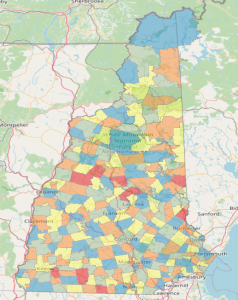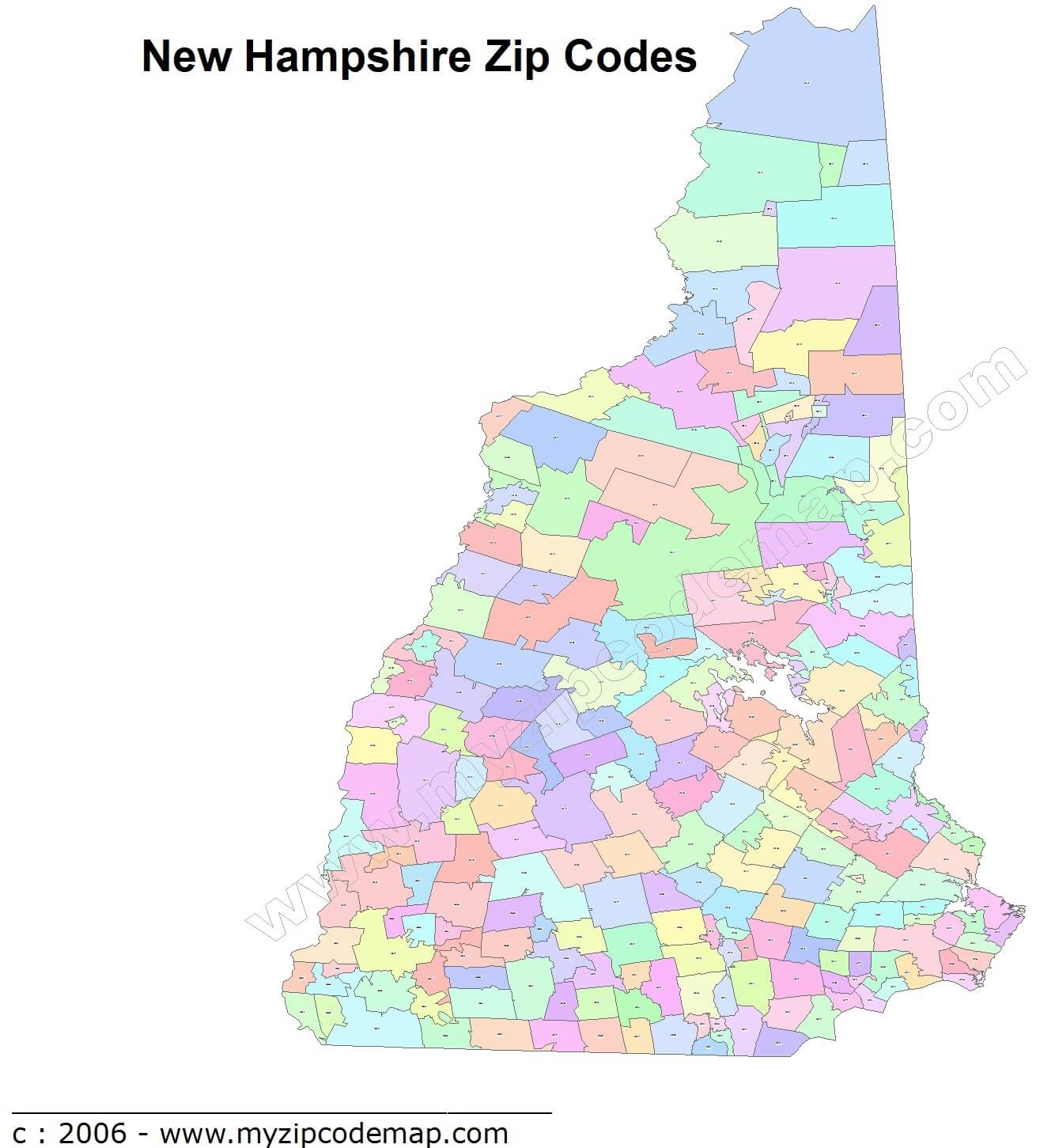Navigating New Hampshire: A Comprehensive Guide to Zip Code Mapping
Related Articles: Navigating New Hampshire: A Comprehensive Guide to Zip Code Mapping
Introduction
In this auspicious occasion, we are delighted to delve into the intriguing topic related to Navigating New Hampshire: A Comprehensive Guide to Zip Code Mapping. Let’s weave interesting information and offer fresh perspectives to the readers.
Table of Content
Navigating New Hampshire: A Comprehensive Guide to Zip Code Mapping

New Hampshire, the Granite State, boasts a diverse landscape, from the rugged mountains of the White Mountains to the picturesque coastline. This geographical diversity is reflected in its intricate network of towns and cities, each with its unique identity and characteristics. Understanding the state’s geographic layout is crucial for various purposes, from navigating its roadways to comprehending its demographic patterns. Zip code maps provide a valuable tool for this understanding, offering a clear visual representation of the state’s postal code system.
Understanding the Significance of Zip Codes
Zip codes, formally known as Zoning Improvement Plan codes, are a system developed by the United States Postal Service to streamline mail delivery. Each zip code corresponds to a specific geographic area, facilitating efficient sorting and distribution of mail. In New Hampshire, these codes are essential for a variety of reasons:
- Efficient Mail Delivery: The primary purpose of zip codes is to ensure prompt and accurate mail delivery. By using the correct zip code, residents and businesses ensure their mail reaches its destination without delay.
- Demographic Analysis: Zip codes provide valuable insights into population distribution, demographics, and socioeconomic characteristics. This data is crucial for businesses, researchers, and government agencies in understanding the state’s population trends and planning for future needs.
- Emergency Services: In emergencies, zip codes are vital for identifying the location of an incident and dispatching the appropriate emergency services, such as police, fire, and ambulance personnel.
- Geographic Information Systems (GIS): Zip codes are an integral component of Geographic Information Systems, which are used to analyze spatial data and create maps for various purposes, including urban planning, environmental monitoring, and resource management.
Delving into New Hampshire’s Zip Code Map
New Hampshire’s zip code map is a complex tapestry of codes, reflecting the state’s diverse geography and population distribution. The map showcases how the state’s 10 counties, each with its unique characteristics, are subdivided into smaller postal areas.
- Northern Tier: The northern tier of the state, dominated by the White Mountains, features zip codes associated with towns like Berlin, Littleton, and Lancaster. These areas are characterized by a mix of rural communities, outdoor recreation destinations, and industrial centers.
- Central Region: The central region, encompassing the state capital of Concord, is home to a diverse range of zip codes reflecting its urban and suburban character. This region features a mix of bustling cities, quaint towns, and rural communities.
- Southern Region: The southern region, bordering Massachusetts, features a concentration of zip codes associated with coastal towns like Portsmouth, Hampton, and Exeter. This area is known for its historic charm, bustling tourism industry, and vibrant arts and culture scene.
- Western Region: The western region of the state, bordering Vermont, features zip codes associated with towns like Keene, Claremont, and Lebanon. This region offers a mix of rural landscapes, historic towns, and industrial centers.
Benefits of Using a Zip Code Map
- Enhanced Navigation: Zip code maps provide a clear visual representation of the state’s postal code system, aiding in navigation and understanding the layout of different towns and cities.
- Targeted Marketing: Businesses can utilize zip code maps to target specific geographic areas with their marketing campaigns, ensuring their message reaches the intended audience.
- Real Estate Research: Homebuyers and real estate professionals can use zip code maps to understand the location and characteristics of different neighborhoods, facilitating informed decision-making.
- Educational Purposes: Zip code maps are valuable educational tools for students learning about geography, demographics, and population distribution.
FAQs about Zip Code Maps in New Hampshire
Q: How can I find a specific zip code in New Hampshire?
A: Several resources are available for finding specific zip codes, including online mapping tools, the United States Postal Service website, and online directories.
Q: Can I use a zip code map to find the nearest grocery store or bank?
A: While zip code maps primarily focus on postal codes, they can be used in conjunction with other online mapping tools to locate nearby businesses and services.
Q: Are there any limitations to using zip code maps?
A: Zip code maps provide a general overview of postal codes and geographic areas. However, they may not always reflect the exact boundaries of towns or cities, especially in areas with complex boundaries or overlapping zip codes.
Tips for Using Zip Code Maps Effectively
- Consider the scale of the map: Choose a map with a scale that meets your specific needs, whether you require a detailed view of a specific area or a broader overview of the entire state.
- Use multiple resources: Combine zip code maps with other mapping tools and resources, such as street maps, online directories, and GPS systems, for a more comprehensive understanding of the state’s layout.
- Stay updated: Zip code boundaries may change over time, so ensure you are using the most recent version of the map.
Conclusion
Zip code maps are a valuable tool for navigating New Hampshire’s diverse landscape and understanding its intricate network of towns and cities. By providing a clear visual representation of the state’s postal code system, these maps facilitate efficient mail delivery, demographic analysis, emergency response, and informed decision-making in various fields. Whether you are a resident, business owner, or visitor, understanding the significance of zip code maps can enhance your experience and interactions within the Granite State.







Closure
Thus, we hope this article has provided valuable insights into Navigating New Hampshire: A Comprehensive Guide to Zip Code Mapping. We appreciate your attention to our article. See you in our next article!
